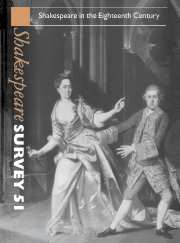Book contents
- Frontmatter
- Shakespeare and the Eighteenth Century: Criticism and Research
- Daddy’s Girls: Shakespearian Daughters and Eighteenth-Century Ideology
- Shakespeare and Clarissa: ‘General Nature’, Genre and Sexuality
- Early Georgian Politics and Shakespeare: The Black Act and Charles Johnson’s Love in a Forest (1723)
- Race Mattered: Othello in Late Eighteenth-Century England
- From Pericles to Marina: ‘While Women are to be had for Money, Love, or Importunity’
- ‘A Thousand Twangling Instruments’: Music and The Tempest on The Eighteenth-Centruy London Stage
- Double Falsehood and the Verbal Parallels with Shelton’s Don Quixote
- Eighteenth-Century Performances of Shakespeare Recorded in the Theatrical Portraits of the Garrick Club
- Eighteenth-Century Editing, ‘Appropriation’, and Interpretation
- Shakespeare Survey: Beginnings and Continuities
- Destined Livery? Character and Person in Shakespeare
- Prejudice and Law in The Merchant of Venice
- ‘Many A Civil Monster’: Shakespeare’s Idea of the Centaur
- Shakespeare’s International Currency
- Repeopling the Globe: The Opening Season at Shakespeare’s Globe, London 1997
- Shakespeare Performances in England, 1997
- Professional Shakespeare Productions in the British Isles, January–December 1996
- TheYear's Contributions to Shakespeare Studies: 1 Critical Studies
- 2 Shakespeare’s Life, Times, and Stage
- 3 Editions and Textual Studies
- Books Received
- Index to Volume 51
- General Index to Volumes 41–50
Shakespeare and Clarissa: ‘General Nature’, Genre and Sexuality
Published online by Cambridge University Press: 28 March 2007
- Frontmatter
- Shakespeare and the Eighteenth Century: Criticism and Research
- Daddy’s Girls: Shakespearian Daughters and Eighteenth-Century Ideology
- Shakespeare and Clarissa: ‘General Nature’, Genre and Sexuality
- Early Georgian Politics and Shakespeare: The Black Act and Charles Johnson’s Love in a Forest (1723)
- Race Mattered: Othello in Late Eighteenth-Century England
- From Pericles to Marina: ‘While Women are to be had for Money, Love, or Importunity’
- ‘A Thousand Twangling Instruments’: Music and The Tempest on The Eighteenth-Centruy London Stage
- Double Falsehood and the Verbal Parallels with Shelton’s Don Quixote
- Eighteenth-Century Performances of Shakespeare Recorded in the Theatrical Portraits of the Garrick Club
- Eighteenth-Century Editing, ‘Appropriation’, and Interpretation
- Shakespeare Survey: Beginnings and Continuities
- Destined Livery? Character and Person in Shakespeare
- Prejudice and Law in The Merchant of Venice
- ‘Many A Civil Monster’: Shakespeare’s Idea of the Centaur
- Shakespeare’s International Currency
- Repeopling the Globe: The Opening Season at Shakespeare’s Globe, London 1997
- Shakespeare Performances in England, 1997
- Professional Shakespeare Productions in the British Isles, January–December 1996
- TheYear's Contributions to Shakespeare Studies: 1 Critical Studies
- 2 Shakespeare’s Life, Times, and Stage
- 3 Editions and Textual Studies
- Books Received
- Index to Volume 51
- General Index to Volumes 41–50
Summary
UNIVERSALITY AND DIFFERENCE
Most critics in the eighteenth century, unlike academic critics today, were confident of at least one assumption about great literature: that the truths it embodied were universal and that, in the words of Dr Johnson in his Preface to Shakespeare, ‘Nothing can please many and please long but just representations of general nature.’ It is a view which depends of course on even more basic assumptions – that there is such an entity as ‘general nature’ (or at least that the category is useful); and that in turn there is such an entity (or meaningful category) as ‘human nature’ – a certain intrinsic ‘humanness’ which remains in some way constant despite variations from country to country and race to race, and despite the changes in behaviour over time. But while it might be agreed that there are some constant factors in human behaviour (without which it is difficult to see how we could respond to the literature of the past at all), the notion of a ‘human nature’ (whether as an essence, a useful category or some kind of shadowy ideal), has become (notoriously) in recent years almost impossible to use. It is probably fair to say that some such view lay behind nearly all literary criticism from Johnson’s time (and indeed before) to our own. Questioned or rejected as these ideas have been by the various forms of deconstruction, post-structuralism, new historicism and the like, literary criticism has, again notoriously, become uncertain of its foundations and has looked about for new ones.
- Type
- Chapter
- Information
- Shakespeare Survey , pp. 27 - 44Publisher: Cambridge University PressPrint publication year: 1998
- 2
- Cited by

